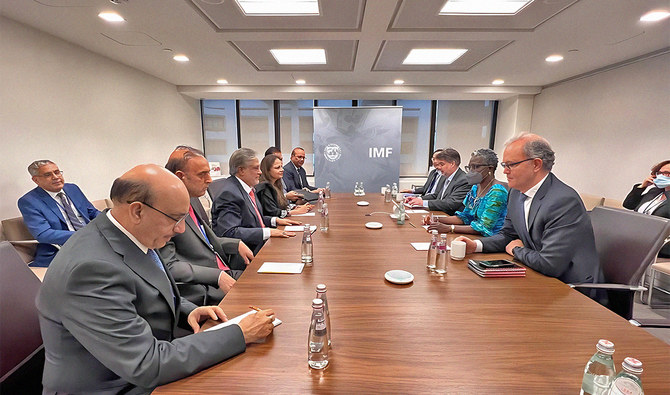The IMF has said it is not concerned with the Finance Minister’s move to freeze the federal petroleum development levy.
By Ahmer Kureishi
Finance Minister Ishaq Dar is in Washington DC – and the domestic commentariat is in suspense. Can he square with the International Monetary Fund (IMF)? In particular, can he justify his decision to lower pump prices instead of jacking up a federal levy imposed to cut the budget deficit?
There is no denying that the question is important. The IMF is the nearest thing we have to an international lender of last resort. If Pakistan’s Fund bailout goes south, the country is in big trouble, with default on external obligations all but certain.
If, on the other hand, the IMF rubber-stamps Dar’s policy, the country secures substantial fiscal and monetary space to not only turn around its economy but also undertake resilient reconstruction in the wake of this monsoon’s cataclysmic flooding.
With so much riding on it, it was inevitable that a journalist would pop the question the moment somebody in a position of responsibility at the IMF became available. That somebody in this case was Jihad Azour, Director of Middle East and Central Asia Department, and the occasion was IMF’s October 2022 Middle East and Central Asia Department press briefing.
A journalist plopped in the question point blank: Fuel prices in Pakistan “have been reduced. Do you think it’s a violation of the IMF deal?” And she added: “Also, how confident you are with the current government to fulfil its commitments to the IMF?”
His response meandered around the issue for a while, but in the end, he said it just as Pakistan’s grayheded Finance Minister would like it: “[T]his is something that it’s not, I would say, part of the IMF conditionalities, this is part of what is needed in order to provide the right protection for those who need it at the time where inflation is very high.”
Dar has been contending on this precise question with pretty much everybody at home, starting with his predecessor Dr Miftah Ismail: The move to pass on to the consumers the impact of lower international petroleum prices is not something that would vitiate Pakistan’s relationship with the IMF. Now his position stands vindicated.
Another remark by Azour that should be of interest to observers in Pakistan was that the Fund is “waiting currently for the assessment of the damages that World Bank and UNDP are conducting in order to see what are on one hand the repercussions on public finance and the impact on the economy and on the society.”
The insight here is that while it is acceptable and even expected for international institutions like the Fund to sit tight while damage assessment is underway in the wake of a disaster, the authorities in that country, whose responsibility it is to take care of their own, do not have that luxury.
Which is to say, hundreds and thousands of men, women, and children camped out under the open sky in the wake of flooding could not wait for authoritative damage assessments to arrive in Washington before relief can be rushed to them. They had to be helped then and there.
This is why the government was left with reshuffling the deck and reappropriating resources to meet the contingency. The world may take its time, but eventually it will rally round and line up help.
Jihad Azour left no doubt that the IMF and its allied international institutions are prepared to stand by Pakitan in this trying hour when he said, “The Fund has been very supportive to Pakistan over the last period.
“We have a program with Pakistan that has been extended and increased in size. This is to help Pakistan deal with the confluence of shocks starting with the Covid crisis where we provided additional flexibility.
“We accelerated some of our disbursement to recently the exogenous shocks and the shock of increase in price of food and commodity. We had recently completed a review that provided Pakistan with $1.2 billion and hopefully we will be fielding a mission in November after the annual meetings to Pakistan in order to start with the authorities preparing for the next review.”
“We are waiting currently for the assessment of the damages that World Bank and UNDP are conducting in order to see what are on one hand the repercussions on public finance and the impact on the economy and on the society.
“Based on this assessment, we will need to update our numbers and based on our discussion with the authorities, we will also listen to them to see what are their priorities, and how the Fund can help.”
This clearly means that the IMF is open to expanding its assistance to Pakistan in view of the biblical catastrophe that has hit the country; and that it is prepared to listen to Ishaq Dar’s vision of the economy and his expectations of the IMF.
It would seem that the IMF – unlike the local commentariat – is rooting for Ishaq Dar. Or is the IMF is rooting for Pakistan?
Copyright © 2021 Independent Pakistan | All rights reserved




